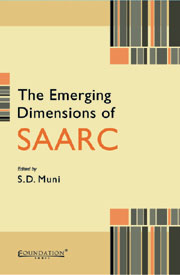Book contents
- Frontmatter
- Contents
- Preface
- List of Figures
- List of Tables
- 1 SAARC Prospects: The Changing Dimensions
- 2 SAARC and South Asian Economic Integration
- 3 Coping with the Emerging Challenges: Poverty and Food Security
- 4 SAARC Energy Cooperation: Energy Security and Environmental Challenges
- 5 Sub-Regional Cooperation under SAARC: An Economic Analysis
- 6 SAARC: Social Charter and Human Security
- 7 SAARC and the South Asian Security Architect
- 8 Fighting Terrorism through SAARC?
- 9 SAARC and the Evolving Asian Regionalism
- 10 Role of SAARC Observers: Members' Perspectives
- 11 Role of SAARC Observers: Observers' Perspectives
- 12 Concluding Remarks
- About the Contributors
- Index
3 - Coping with the Emerging Challenges: Poverty and Food Security
Published online by Cambridge University Press: 26 October 2011
- Frontmatter
- Contents
- Preface
- List of Figures
- List of Tables
- 1 SAARC Prospects: The Changing Dimensions
- 2 SAARC and South Asian Economic Integration
- 3 Coping with the Emerging Challenges: Poverty and Food Security
- 4 SAARC Energy Cooperation: Energy Security and Environmental Challenges
- 5 Sub-Regional Cooperation under SAARC: An Economic Analysis
- 6 SAARC: Social Charter and Human Security
- 7 SAARC and the South Asian Security Architect
- 8 Fighting Terrorism through SAARC?
- 9 SAARC and the Evolving Asian Regionalism
- 10 Role of SAARC Observers: Members' Perspectives
- 11 Role of SAARC Observers: Observers' Perspectives
- 12 Concluding Remarks
- About the Contributors
- Index
Summary
Expenditure Poverty
Since April 2007, SAARC has had eight members with Afghanistan joining in. In December 1985, the seven founder members were Bangladesh, Bhutan, India, Nepal, Maldives, Pakistan and Sri Lanka. Definitions of South Asia often vary, such as on inclusion of Iran and Myanmar, especially if a Greater Middle East region is conceived, or based on geographical (countries that are on the Indian plate) or historical (the British colonial legacy) ground. However, for all practical purposes, SAARC can be used as a synonym for South Asia.
Data made available through various surveys establishes SAARC to be a poor region. Table 3.1 shows summary of such surveys conducted in SAARC nations during different periods from 1995–96 to 1999–00. Those surveys, as prevalent in many countries of the world, are based on expenditure and not income, which is somewhat unreliable.
Table 3.1 indicates that:
data are not available for countries like Afghanistan, Bhutan and Maldives,
computation of head count ratios on poverty requires household surveys. As the table shows, surveys are often dated. These surveys suffer from the mismatch or under-reporting problem, in the sense that the aggregate of consumption expenditure obtained through household surveys falls short of the aggregate of consumption expenditure obtained through national accounts. Down the years, this gap has increased rather than being decreased. This raises a conceptual concern. How can one hope to correlate the trickle-down benefits of growth on poverty reduction if the growth is captured in the national accounts data, but not in the survey data?
[…]
Information
- Type
- Chapter
- Information
- The Emerging Dimensions of SAARC , pp. 51 - 80Publisher: Foundation BooksPrint publication year: 2010
